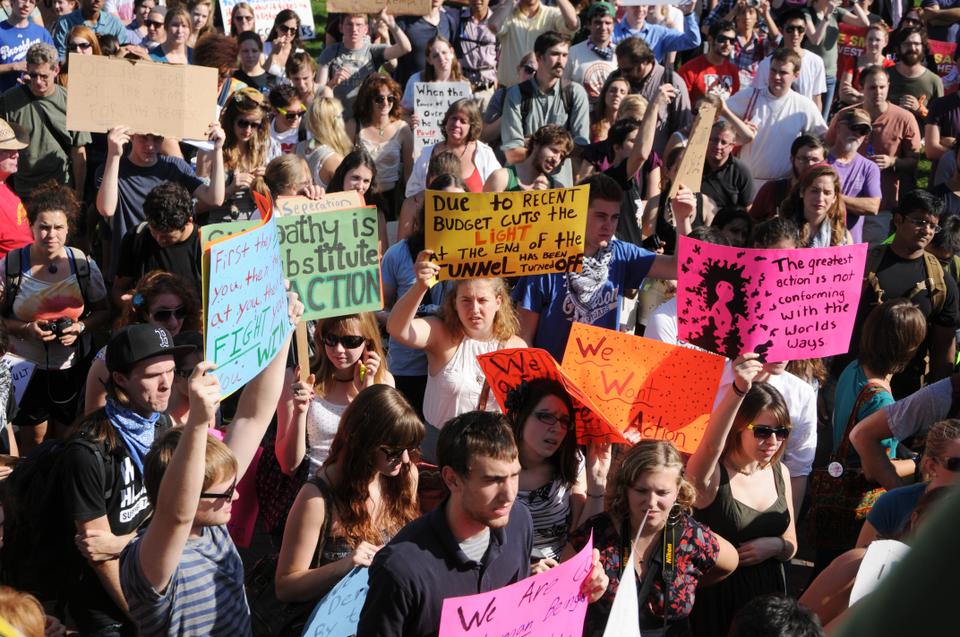
News
Harvard Grad Union Agrees To Bargain Without Ground Rules

News
Harvard Chabad Petitions to Change City Zoning Laws

News
Kestenbaum Files Opposition to Harvard’s Request for Documents

News
Harvard Agrees to a 1-Year $6 Million PILOT Agreement With the City of Cambridge

News
HUA Election Will Feature No Referenda or Survey Questions
Voicing Discontent, Occupy Boston Packs Boston Common
Tensions rise high between police and protesters, including Harvard contingent

BOSTON—Hundreds of protesters, including a Harvard contingent of more than 80 students and affiliates, gathered on the Boston Common Monday for an “Occupy Boston” rally, passionately chanting “This is what democracy looks like!”
Tuesday morning around 1:30 a.m., tensions rose high in Dewey Square as scores of police officers cautioned protesters, including several Harvard students, to vacate the Square, where the activists have been camped out since Oct. 1. The officers subsequently began arresting activists at one of the camps.
Voicing their discontent with the current state of politics and the economy. the protesters have taken over Dewey Square, located in the heart of Boston’s financial district across the street from South Station.
Monday’s rally brought affiliates of various Boston-area universities together on the Common before they set off to march through the financial district. As protesters proceeded from the Common, the numbers grew into the thousands.
Before joining the rally in Boston Common, Harvard students gathered in front of the John Harvard statue to show solidarity with other sympathetic members of the Harvard community.
Hannah L. Hofheinz, a fifth year doctoral candidate at the Harvard Divinity School, was one of the many organizers of the “Occupy Harvard” event. Hofheinz cited her concern for the future of the United States as her inspiration for standing with the Occupy Boston movement.
“Or country is hurting, and people are hurting,” Hofheinz said. “It’s important that, as students, human beings, people, that we come together and change [these] social systems.”
The Occupy Boston movement drew its inspiration from Occupy Wall Street, a protest movement which began in mid-September in New York.
Graduate School of Arts and Sciences Student Marisa M. Egerstrom was previously involved with Occupy Wall Street and is now supporting Occupy Boston.
Speaking to the crowd gathered in front of University Hall, Egerstrom explained what she sees as a unique opportunity for social change.
“What we have is an opportunity in America to organize in ways that I haven’t seen in the history of the last 40 years,” Egerstrom said. “And many of us have been pissed off for a very long time, but what we’re finding is that a new form of hope is coming to life.”
Occupy Wall Street and Occupy Boston have until now been seen as primarily left-leaning student movements with no clear goals, but as the number of supporters grows, the demographics are becoming increasingly diverse.
In addition to members of Harvard’s Student Labor Action Movement, the audience at the Occupy Harvard event included members of several religious groups as well as members of the conservative grassroots Tea Party movement.
“You can’t categorize this as a bunch of disgruntled hippies being against stuff just to be against stuff,” Egerstrom said.
Egerstrom disagreed with the way in which the protests are being portrayed, explaining that the familiar protest narratives of the 1960s and 1970s are different from Occupy Boston.
“The media looks for the narratives they’re used to finding. They’re used to seeing popular unrest ... and they’re really recycling the image,” Egerstrom said. But she acknowledges that other protests in the past decade, particularly against the War on Terror, have often “conformed themselves to that image.”
William L. Polette, a Boston resident who participated in yesterday’s march, described Occupy Boston in a favorable light.
“I’m starting to see a mix [of demographics]. There are definitely more students, but as we speak, it’s getting larger and larger,” Polette said.
Although Occupy Boston has generally remained peaceful and non-disruptive, yesterday’s march led to at least two arrests.
Additionally, many Boston residents voiced frustration with the traffic congestion caused by the march.
On Sunday, Boston Mayor Thomas M. Menino indicated his own growing frustration with Occupy Boston. He said the city will decide in the coming days whether it will allow the protesters to continue.
That tension mounted Tuesday morning as police confronted activists camped in Dewey Square.
—Check TheCrimson.com for updates.
—Staff writer Jose A. DelReal can be reached at jdelreal@college.harvard.edu.
Want to keep up with breaking news? Subscribe to our email newsletter.
Related Articles
From Our Advertisers

Over 300+ courses at prestigious colleges and universities in the US and UK are at your disposal.

With innovative financial tools combined with financial education, Collegiate empowers students to take control of their finances and build confidence in their money management skills.

Serve as a proctor for Harvard Summer School (HSS) students, either in the Secondary School Program (SSP), General Program (GP), or Pre-College Program.

With an increasingly competitive Law School admissions process, it's important to understand what makes an applicant stand out.

Welcome to your one-stop gifting destination for men and women—it's like your neighborhood holiday shop, but way cooler.

HUSL seeks to create and empower a community of students who are seeking pathways into the Sports Business Industry.
